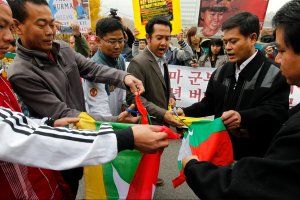
Elections in Burma last week, the first in 20 years, marked the isolated nation's long-awaited transition from military to civilian rule. While many have rightly observed that the vote was little more than a rubber-stamp procedure designed from the start to allow the military junta to prevail, the regime has managed to maintain its iron-fisted rule not simply by vote rigging but also by creating a coterie of corporate cronies elected to help the generals rule by proxy.
It's not yet clear how many business loyalists have won seats in Parliament. Yet outside analysts say roughly 100 of them campaigned for the elections, and some have already been brought into the government in an official capacity. "These businesspeople are acting partly according to command and partly out of a belief that favors and concessions might come their way later," says Sean Turnell, a leading expert on the Burmese economy and professor at Macquarie University in Sydney.
Other business leaders have chosen to stay outside government, but over the past year they have used their ties to the regime to scoop up a large number of state-owned assets for virtually nothing. These tycoons—often the relatives or drinking buddies of the ruling generals—are increasingly calling the shots in what appears to be a counterpoint to Russia's notorious oligarchs. "I don't think the tycoons have any power yet over … the SPDC [the 11 military officers who make up Burma's ruling Politburo], but they rank right below them, and certainly over the cabinet ministers," says Turnell.
The government's decision this year to privatize the nation's mismanaged economy represents the biggest sell-off of state assets since 1962, when the junta came to power. Recent sales, totaling hundreds of millions of dollars, include the obvious: hundreds of government buildings and telecommunications facilities, as well as portions of the country's seaports and the national airline. In Rangoon, Burma's largest city, one sale by the state Privatization Committee listed 176 assets, many of them historic government buildings like the attorney general's office, the Ministry of Industry, and the state archeological department, according to a report by The New York Times. In 2005, when the junta decamped to the out-of-the-jungle model city of Naypyidaw, these colonial masterpieces were left to rot.
Less obvious assets—schools, hospitals, power-distribution centers—are also being put on the auction block. Even the country's golden-goose mines for precious minerals are being split apart piecemeal, as are dozens of factories and industrial-scale farms, which the junta nationalized nearly half a century ago.
The state's retreat is not encouraging the private sector to flourish; experts say privatization was designed to benefit the regime's civilian friends and relatives. Privatization of education and health care are, for example, seen as relief valves for the elite, who can now send their children to private schools and their families to private hospitals where services would be better and more modern than those available through the collapsed state system. So while, on the surface, the rise of Burma's private sector may seem like the sort of Chinese-style reform that could finally loosen the generals' grip on the economy, the properties are going straight into the hands of the business elite. And any hope that the proceeds from selling state property might go toward salary raises for beleaguered civil servants, or toward a welfare program for the bulk of the 55 million Burmese who still live in grinding poverty, has not panned out.
Indeed, unlike Vietnam or China, where privatization liberalized the economies by putting more nimble private entrepreneurs at the helm of sectors like manufacturing, Burma is merely rewarding its oligarchs for their role in propping up the flagging regime. According to one report, Tay Za, a Burmese millionaire sanctioned by the U.S. for his ties to the state, added several properties to his already vast empire and was appointed the head of a petroleum commission.
In theory, the rise of Burma's crony capitalists could moderate the brutality of a regime that holds 2,000 political dissidents in prison and heavily controls almost all aspects of everyday life. While a quarter of the seats in Parliament are still set aside for military officers, the new Constitution stipulates that policy can no longer be decreed by military fiat and instead must be decided by the civilian Parliament. Earlier this year reports surfaced that there has been some relaxation of seemingly arbitrary rules such as a ban on private car ownership. And the regime appears to have loosened media censorship, as stories criticizing child and forced labor have begun appearing in the pages of state-owned newspapers. With the elections now over, the junta is also expected to release Burma's most beloved dissident: Aung San Suu Kyi, the Nobel laureate who, along with her political party, boycotted the elections.
Yet any small political or economic freedoms brought about by the rise of these business leaders are likely a long way off. Outside analysts for the most part agree that the recent changes do little more than formalize the succession process for the junta, which will now rule through its civilian allies, the newly minted tycoons. Indeed, if anything, there has been a security crackdown in the past few months in the lead-up to the elections. Internet speeds have been significantly throttled to prevent news leaks from the elections, opposition parties were essentially forbidden to hold political rallies, and all manner of public debates were banned. Foreign journalists and observers were also blocked from entering the country to cover or monitor the elections. "One day … [the] tycoons will run up against this very tight control over the economy," says Turnell. Until then, however, the rise of Burma's corporate henchmen likely means business as usual for the long-suffering nation.
Uncommon Knowledge
Newsweek is committed to challenging conventional wisdom and finding connections in the search for common ground.
Newsweek is committed to challenging conventional wisdom and finding connections in the search for common ground.





